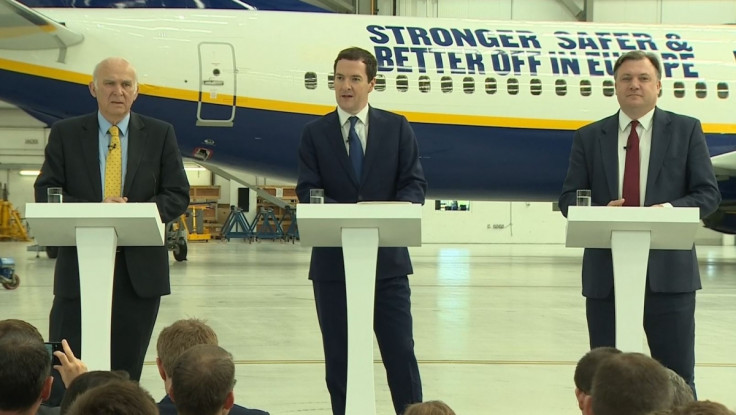'Does Britain really want DIY recession?' asks George Osborne one month before EU referendum
A vote for Britain to leave the EU is a vote for a year-long recession, David Cameron and George Osborne are warning just one month ahead of the UK's referendum on 23 June. In a bid to persuade voters to reject a Brexit, the prime minister and chancellor are turning to new Treasury analysis, which suggests GDP will be 3.6% lower after two years if the country chooses to leave the European Union.
According to the analysis – which is set to be published later today (23 May) – leaving would trigger thousands of job losses and cause the value of the pound to drop. A "severe-shock" scenario – whereby Britain is unable to reach a deal with the EU and tariffs are introduced – could leave the economy 6% worse off and "unemployment would rise by even more."
Writing in the Telegraph, Cameron and Osborne both stated: "It is clear that there would be an immediate and profound shock to our economy.
"The analysis produced by the Treasury today shows that a vote to leave will push our economy into a recession that would knock 3.6 per cent off GDP and, over two years, put hundreds of thousands of people out of work right across the country, compared to the forecast for continued growth if we vote to remain in the EU."
The Treasury analysis is its second and last Brexit piece ahead of the crucial vote and Osborne will be looking to capitalise on it before the official purdah period starts later this week.
Speaking at a business located on the south coast later today, Osborne will say: "It's only been eight years since Britain entered the deepest recession our country has seen since the Second World War. Every part of our country suffered. The British people have worked so hard to get our country back on track.
"Do we want to throw it all away? With exactly one month to go to the referendum, the British people must ask themselves this question: can we knowingly vote for a recession? Does Britain really want this DIY recession? Because that's what the evidence shows we'll get if we vote to leave the EU."

Despite the stark warning from the Remain camp, pro-Brexit group Vote Leave slammed the report and urged voters to reject it. "As George Osborne has himself admitted, the reason he created the independent forecaster, the OBR, was because by 2010 the public simply did not believe the Government's own economic forecasts," said leading Brexit campaigner Iain Duncan Smith.
"The Treasury has consistently got its predictions wrong in the past. This Treasury document is not an honest assessment but a deeply biased view of the future and it should not be believed by anyone," he added.
Last month, a Treasury paper on the longer-term impact of a Brexit claimed each household would be worse off by the equivalent of £4,300 ($6,236) a year by 2030. While that figure was strongly contested by the Leave camp, it nonetheless resonated with voters.
"The evidence is unequivocal: that would put our economy in serious danger and make the country permanently poorer," wrote Cameron and Osborne.
"When this is being backed up by the International Monetary Fund, the OECD, the London School of Economics, eight former US Treasury secretaries, the President of the United States of America, businesses big and small, every one of our allies and trading partners and the Governor of the Bank of England, it isn't a conspiracy but a consensus."
A poll of polls by the Financial Times put Remain on 47% with Leave trailing on 40%, suggesting that the pro-EU camp's warnings over the economy are having the desired effect.
© Copyright IBTimes 2025. All rights reserved.






















